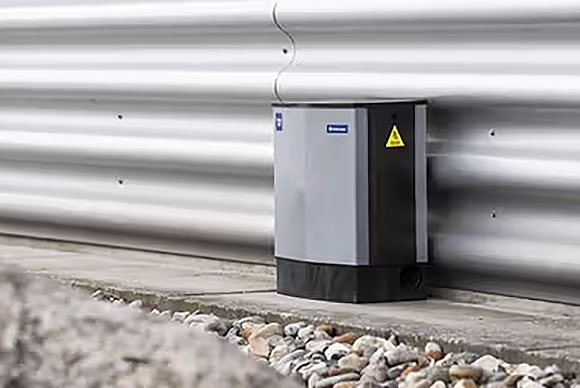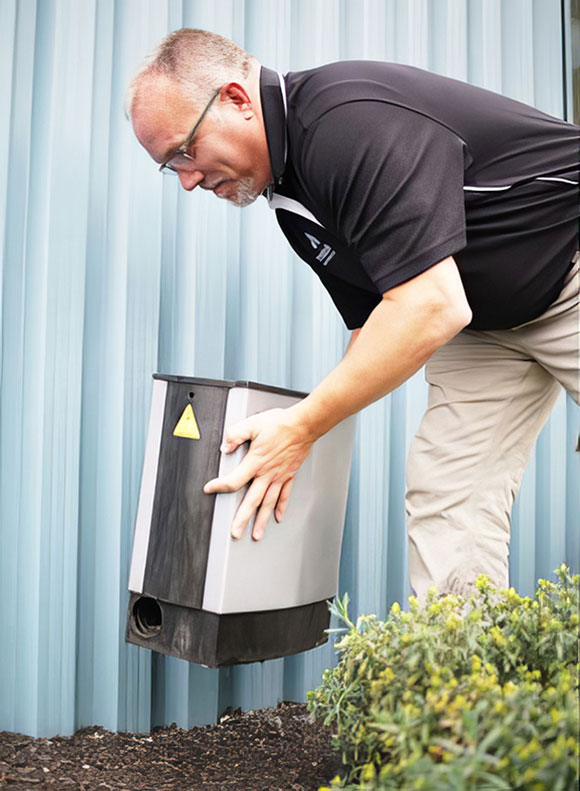
SMART boxes have become an integral part of the city’s efforts to control rodent infestation. — Photos courtesy of Anticimex
By Lillian Peck
In a virtual informational session hosted on Thursday, January 9, at 5 p.m., Somerville Inspectional Services Department Staff and the SomervilleViva Office of Immigrant Affairs introduced an important matter to public discussion – rodent control. The goals of the meeting were to help attendees learn how to identify rat activity, use control methods, develop prevention strategies, and utilize city resources.
“This year, it’s a personal goal of mine and our program to make ourselves more known to the city so that they can reach out to us a lot more,” said Alicia Privett, Somerville’s Environmental Health Coordinator with the Inspectional Services Department. “We’re trying to increase these workshop presentations so that people can see examples and be more hands-on with these practices we’re trying to educate about.”
The workshop opened by exploring rat recognition education, emphasizing that Somerville is home to various rodents, including mice, opossums, squirrels, and groundhogs.
“Somerville is a great environment for rodents because we’re a mixture of urban and suburban, in a way, so a lot of porches and backyards, but it’s so densely packed, so it kind of allows rats to live close to food sources, hide in porches and backyards, things like that,” said Privett.
The presentation highlighted key facts about rats, including their social nature, use of smells for communication, and behaviors like burrowing, nesting, and chewing to manage their rapidly growing teeth. It also covered their reproduction rates (an average of 8 pups per litter with a 24-day gestation), size (6-8 inches), droppings (½-¾ inches long), lifespan (2-4 years), and nocturnal habits. Droppings are typically found near trash or food sources, gnaw marks near trash cans, fences, or under porches, and burrows of 2-4 inches wide and 12 inches deep near foundations of buildings, porches, or items stored outdoors, under plants. Burrows tend to contain twigs or trash and will have at least two entrances.
Privett, who authored the virtual informational session’s rodent control presentation, also detailed the phenomenon of runways, or pathways, that rats leave as they travel from one location to feed at another. These runways, typically found along straight surfaces such as fences or walls, appear as trodden grass, dirt paths with eroded plant life, or packed-down soil due to frequent use. When rats rub against surfaces, they sometimes leave dark marks due to the oil on their fur.
Privett stressed that rats and rodents can cause property damage and fire hazards, carry disease, and cause anxiety and discomfort in residents who experience sightings.
The program then turned toward prevention measures, detailing how, as a community, Somerville can try to reduce the population of rats as much as possible.
“We primarily educate people on reducing food, water, and shelter for rats, which is the most effective way of getting rid of them in the long term,” said Privett, “If they have adequate food, adequate shelter, and adequate source of water, they’ll breed and thrive. If you take those things away, they are less likely to reproduce, and they’ll likely move to other areas.”
Potential areas of food, water, and shelter include trash and recycling bins, animal waste, bird seed, standing puddles, leaking hoses and faucets, burrows, yard clutter, and overgrowth. To prevent rats from using these resources, Privett and the Inspectional Services team recommend securing and monitoring trash receptacles (and calling 311 to replace bins that have been tampered with), refraining from leaving food for other animals outside, especially at night, and composting correctly. It’s also advised to keep outdoor plants trimmed, remove large trash and yard debris, regularly inspect the home’s exterior for gaps, empty sources of standing water, repair leaks, and use hardware cloth around fence lines and porches.
Two of the biggest misconceptions that Privett has heard about rat control methods are that peppermint and cayenne pepper will help and that it is the fault of individuals. In reality, no scientific research has proven that peppermint and cayenne pepper are effective. More importantly, rat control is a community-wide issue. Working with neighbors to spread information and education and report rodent activity to the 311 number (617-666-3311 if outside of Somerville) is essential.
“They will go on everyone’s properties, and we all have a part to play,” said Privett.
The Inspectional Services Department offers several services regarding rodent abatement, including education outreach and site visits for people who request them. They also offer a Residential Rodent Assistant Program, where residents can receive free rodent control services for two months, including bait boxes and burrow treatments. For more information, contact isdrodentcontrol@somervillema.gov or 311.

ISD also has a policy component to the Department, which includes issuing violations to residences and business buildings. The Inspectional Service Department enforces the State Sanitary Code (105 CMR 410), which covers sanitation violations on private property. If the rodent issue is on public land, the city has a contract with a professional exterminator. If the complaint is on private property, Inspectional Services will enforce the State Sanitary Code and local ordinances when applicable and recommend calling an exterminator.
Although Privett does not have a formal list of exterminator services, she notes that she has worked with various pest control companies, which she tends to recommend to people if asked.
“As the Inspectional Services Department, we are more so the enforcement side of the city, everything that the police doesn’t deal with basically,” said Privett. “We issue violations for rodent-related issues like overflowing trash and dumpsters or having burrows on the property, things like that.”
Beyond that, they collect data to track rodents’ activity and citizen complaints to target their approaches more. In 2024, the Department received 621 complaints, a decrease from the previous year, with the highest number logged between May and September, when rats flourish and reproduce.
“We’re still trying to monitor those complaints and ensure they’re accurate. We will try to address them as they come in,” said Privett.
To collect data and trap rodents, Somerville has launched a six-month SMART city pilot program with Modern Pest Services, which included installing 50 SMART Boxes in four city areas. SMART Boxes are non-toxic trapping units that catch rats and other rodents above ground. They humanely exterminate rodents with electrical currents, do not use toxic bait, are safe for people, other animals, and the environment, and record rodent activity around the clock, sending alerts to Modern Pest Services. To see these boxes at work in Somerville, visit the public heatmap webpage.
“Regarding rat abatement, there’s a high risk of secondary poisoning to birds of prey and pets. So, we have been testing different ways of trying to replace rodenticides, or at least decrease them, so we don’t have to rely on them so much. The SMART boxes were a good option. They capture a lot of rats at one time. Don’t use rodenticide, and they’re easy to move around,” said Privett.
According to Privett, other cities have contacted the Inspectional Services Department about the resources on their website, including the SMART boxes and other rat entrapment and extermination methods. Cambridge and Somerville have worked together on the issue, including the testing of another rodenticide alternative, rodent birth control, a non-toxic alternative that lowers the number of pups produced in a single litter. Although primarily run by Cambridge, the rodent birth control study test sites have been extended to specific areas in Somerville.
“We are open to sharing all this information because rats don’t discriminate. They don’t know city borders,” said Privett. “We all share the same responsibilities and issues. We love working with other cities on this topic.”
Privett and Somerville’s Inspectional Services Department hopes to continue hosting informational workshops in the future, continuing the pattern of education and outreach to a broader audience.
For more information, visit the City of Somerville’s webpage on rodent control or contact Alicia Privett at aprivett@somervillema.gov. To schedule official inspections or sign up for the residential assistance program, email ISDrodentcontrol@somervillema.gov. A recording of the January 9 virtual informational session will be posted on the city’s YouTube channel SomervilleCityTV.















Reader Comments